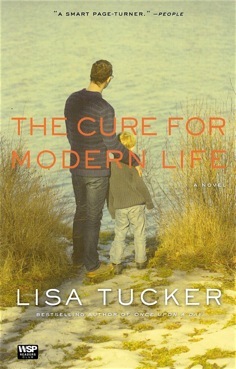

Q. All of the characters are sympathetic at some point in the book, except perhaps the CEO of Astor-Denning, Harold Knolton. He's portrayed as coldhearted and a cheater, certainly one of the first people Amelia would dub as "evil." What were your feelings about Knolton as you were writing about him? Did you imagine a good side was even possible for this character?
A. I think Harold Knolton probably has a good side. He may be kind to his wife, his children, his neighbors, and his pets. Still, I think he is responsible for the way he treats his employees, even though I'm sure he would say he's only doing his job for the shareholders. But if we can always blame institutions for our actions, what becomes of our conscience? This is one of the core issues of the book: how we resolve the tension between the demands of work and our own individual moral code.
Q. The illusory consumer group Pain Matters, which Matthew creates to promote the Astor-Denning drug Galvenar, is used as an example of astroturfing. Can you explain to readers a little more about where this idea comes from and what it means?
A. According to Wikipedia, the term astroturfing was first used by Senator Lloyd Bentsen. The point was to emphasize the difference between legitimate grassroots movements and ones that are faked by a corporation or PR firm; thus the use of the word astroturf -- the artificial grass used in stadiums. Because people tend to trust the opinions of real people more than corporations, pretending you have a grassroots movement for your product (or your candidate) is a particularly insidious way to manipulate the public. The Wikipedia page has lots of great examples; for more info see http://en.wikipedia.org/wiki/Astroturfing.
Q. At one point Amelia claims that all the world's children are part of her family. Is this a sentiment you share, or do you tend to abide by the more traditional definition of family?
A. I think this is a complicated question and I'm not sure I can answer it here. Of course, the issue in the novel is not limited to Amelia -- Matthew, too, ends up creating a nontraditional family, though in his case, he follows his instincts and his heart, rather than a principle or an abstraction. I would love to have the reader come away from the book wondering what his or her responsibilities are to the world's children and to strangers more generally. The less fortunate are perhaps the most obvious example, but also the people who could be affected by something we do -- or fail to do -- in our jobs and in our lives. When Matthew comes face-to-face with Susannah, for example, he realizes that the decisions he has made to market Galvenar may have harmed not only some faceless "percent of consumers," but a real, live person. It's a breakthrough for him, to realize that he, too, bears some responsibility for the welfare of people he doesn't know.
Q. The Cure for Modern Life is filled with examples of the well-being or happiness of an individual versus the greater good. Have you ever encountered this philosophical dilemma personally?
A. I think everyone encounters this dilemma all the time. When we decide not to cut in line at a movie or refuse to take credit for work we didn't do, we are valuing the norms of the group over our own gain. We all know that cooperation is necessary to achieve a civilized society, but it's also necessary at school or work or wherever we become part of something larger than ourselves. Maybe it's easiest to see in the family, because, in a very real sense, a good family is a model of ethical behavior: each person cares about the well-being of the group as much or more as their own happiness. Certainly, all mothers have experienced the necessity of putting aside their own needs for the needs of others. For most of us, acting in service of the greater good is not simply an abstraction, but part of our daily life.
Q. You seem to value compassion above all else in your characters. How does the ideal of compassion play out in your own life?
A. It's true, compassion is incredibly important to me, both as a writer and a person. I think when I can approach someone else with compassion, it is a great gift: to them and to me as well. Compassion not only allows me to understand why people behave as they do, but it also allows me to let go of blame and find forgiveness. Of course, sometimes it is very hard. Admittedly, I don't always get there, but I'm always trying.
Q. All of your novels feature a child or a youthful character who manages to teach valuable lessons to or even transform the adults around them. In what ways has your own son transformed you?
A. The answer to this would probably take all day, but the short version is that my son showed me what love is and what a family should be. He also taught me a lot about being a good person, both in taking care of him and in discussions we have now that he's in college, majoring in philosophy, working on a thesis on ethics. He was a major inspiration for this novel. I'm so proud of the man he's becoming.
Q. This is your fourth novel. How do you feel your writing has changed or developed? Is there anything you still struggle with or do you feel like you've completely hit your stride?
A. Because every novel is different and presents its own unique challenges, I still struggle every time. I wish it would get easier, but it never does. I hope my writing has developed over time, and of course I'm always pleased when a reader or reviewer says I've gotten better in some way. One thing I'm sure of: I am very lucky to have this job. I've never been as engaged by anything as I am by writing. The struggle is part of the joy.
Q. If there's a lesson or a message that you hope readers take away from reading this book, what would it be?
-
A. I don't think in terms of lessons or messages when I'm writing. I hope the readers enjoy the book and of course I hope it makes them think about some of the ethical dilemmas presented here and draw their own conclusions. More than anything, though, I hope the readers remember the characters and think of them from time to time. I hope they catch themselves reliving the moment when Danny watched his mother walk away and imagined her as a dragon, or when Matthew and Danny were outside in Florida and Danny was hugging the ratty palm tree, or any of the moments that made an impression on them as they were reading. One of the things I've always loved about books is that they inhabit my mind long after I turn the last page. I would be deeply honored if my stories could live on in the minds of readers. To me, that would be success.
Q&A
Q. You've certainly mined a provocative and timely topic here. What led you to write this book?
A. I was driving in Philadelphia one night when I saw a young boy, holding a small child, standing on a bridge. I slowed down long enough to realize that their mother was with them, a few steps ahead, yelling for them to hurry, but I wondered what I would have done if they really had been alone. Would I have stopped to help them? Maybe they were walking to a homeless shelter; it was a very cold night. Would I have given them a ride -- or money -- or something -- or would I have been too afraid? From this personal dilemma, the novel was born.
Q. Can you tell us about some of the research you did for this book? What did you learn about pharmaceutical companies that you didn't know before? Have your attitudes about the industry changed at all since you started writing this book?
A. I spent months reading everything I could get my hands on about the business: from books and articles that were highly critical of the pharmaceutical industry to insider publications, pharma-friendly blogs, and the annual reports of several prominent companies. I really didn't know much about Big Pharma when I started, though I disliked their advertising and had problems with the high cost of drugs. My research brought to light certain practices that gave me more qualms about the industry (most of what Amelia accuses them of is true), but I also gained a deep respect for the scientists who work in drug development. Some very brilliant people work in pharma, and the process of finding a new medicine is usually much more difficult than most nonscientists can imagine.
The Cure for Modern Life








